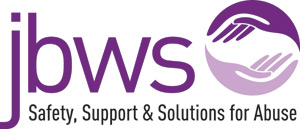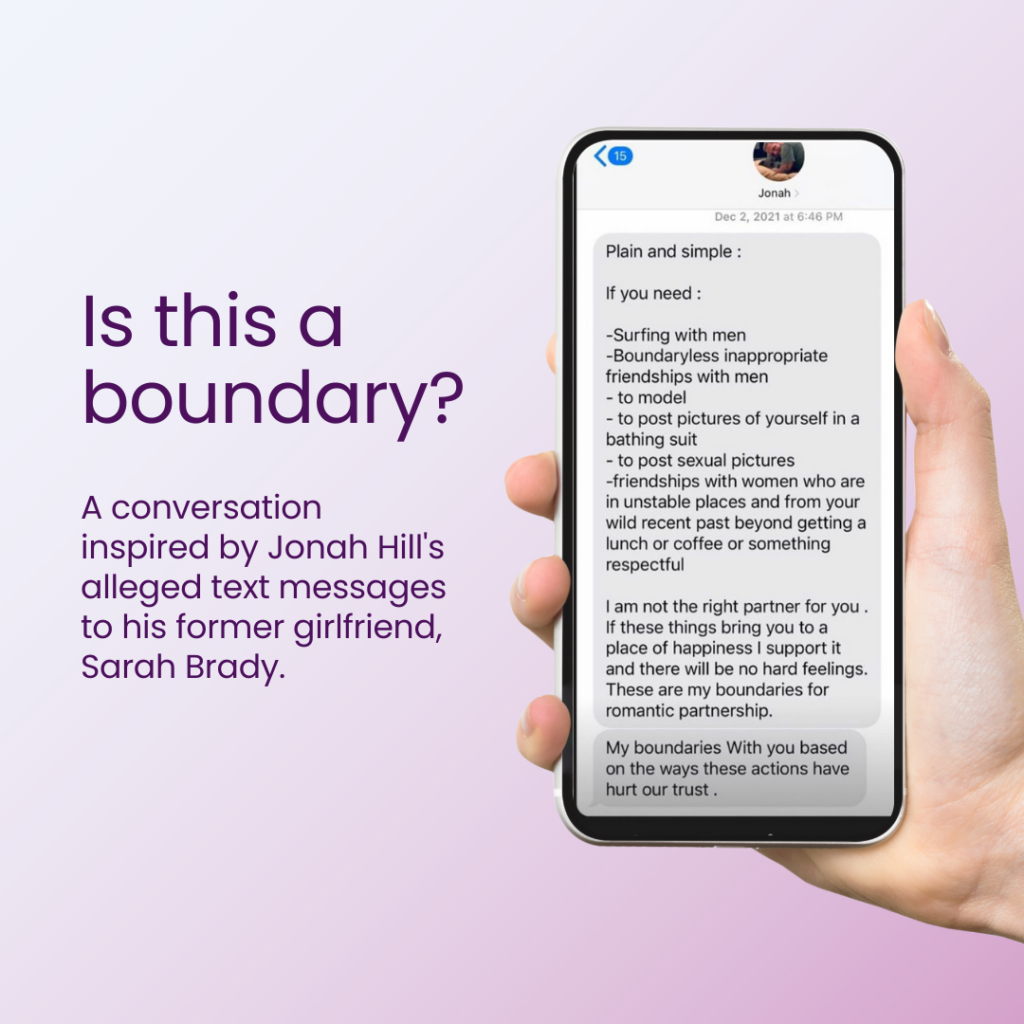Earlier this month, Sarah Brady released a series of alleged text messages between herself and former boyfriend, Jonah Hill. Due to Hill’s celebrity status, these alleged texts have sparked a national conversation about the difference between having boundaries versus controlling your partner.
To explore this issue further, we spoke with Maddie Hahn, MSW, the Manager of JBWS’ Dating Abuse Prevention Program, and Stephanie Klotz, MSW, JBWS’ Professional Training Manager.
Discussing boundaries has become increasingly common on social media lately (and even more so in light of Jonah Hill’s alleged text messages) but there seems to be some confusion as to what a boundary actually means. Can you describe what a healthy boundary looks like?
Klotz: A healthy boundary is a line that determines what is appropriate behavior in our relationship so that both people are respected and safe. For instance, “I need some alone time this weekend” or “I don’t feel like being intimate right now” are both examples of identifying the space you need to be okay.
Hahn: Exactly. Healthy boundaries are for yourself, you cannot put your boundaries on other people. If we apply this to a monogamous relationship, each person in that relationships makes the decision and boundary for themselves to not be with other people. Your partner is not forcing or controlling you to not be with other people. It is a boundary you apply for yourself because you have decided to make this decision within the relationship. Not being intimate with other people is a healthy boundary of a monogamous relationship because it is personally applied by each person, agreed upon, and not forced.
Now that we’ve outlined some healthy boundaries, can we talk about what behaviors or requests could never be classified as boundaries?
Klotz: Yes! People love masking outrageous demands as their “boundaries.” As opposed to what I said before, where the boundary is protecting your personal space, these “boundaries” will be controlling the other person. Saying, “My boundary is that my girlfriend can’t have male friends” or “Anyone I’m with needs to check in with me every hour, it’s just my boundary” aren’t protecting the personal space of the person requesting them. They’re invading the space, or even the potential boundary, of the other person.
Hahn: Being part of the Dating Abuse Prevention Program for adolescents in our community I am going to unpack two examples that could impact teens. In these examples, one is a boundary and the other is control.
Boundary: “Can we have open conversations about who we interact with, and how we generally post on social media so there are no surprises? I respect your personal choices, but having open communication about how we both choose to use personal social media is a boundary of mine and makes me feel secure in our relationship.”
Control: “You are not allowed to follow ______, you cannot like ______ content, and you cannot post _______ content, on any social media platform, it makes me uncomfortable, and it is a boundary I have in a relationship.”
Boundary: “In a partnership, I feel more comfortable if we communicate and share our plans. I think it’s healthy for us to know each other’s general whereabouts, and a boundary of mine to know this about each other. I don’t need constant updates, for me this looks like checking in about our activities, jobs, and general places we like to go just so we know what is going on with one another.”
Control: “You have to share your location with me because it is my right to see your location, where you are, and what you are doing, and this is a boundary I have in relationships.”
Do you have any tips on helping someone differentiate between a healthy boundary and controlling behavior?
Hahn: Ultimately do you feel like your partner’s “boundary”, is controlling and changing things about you that you feel safe and comfortable with? Is their “boundary” changing your actions or behaviors in a way that doesn’t feel authentic to who you are? Would you do this if you weren’t with your partner? A healthy boundary should make both partners feel safe and respected. If you feel changed or controlled, that is not a boundary.
Klotz: And if you’re having a hard time figuring out if your partner’s boundary is actually a boundary or a controlling behavior disguised as one, ask yourself if their request protects their mental, physical or emotional space…or invades yours.
If you notice these behaviors in your partner, please call JBWS’ 24-Hour Helpline: 1.877.782.2873
If you notice these behaviors in yourself, JBWS can help: jbws.org/jcnv or 973-539-7801
Resources:
What is the difference between control and concern?
How to set a healthy boundary

